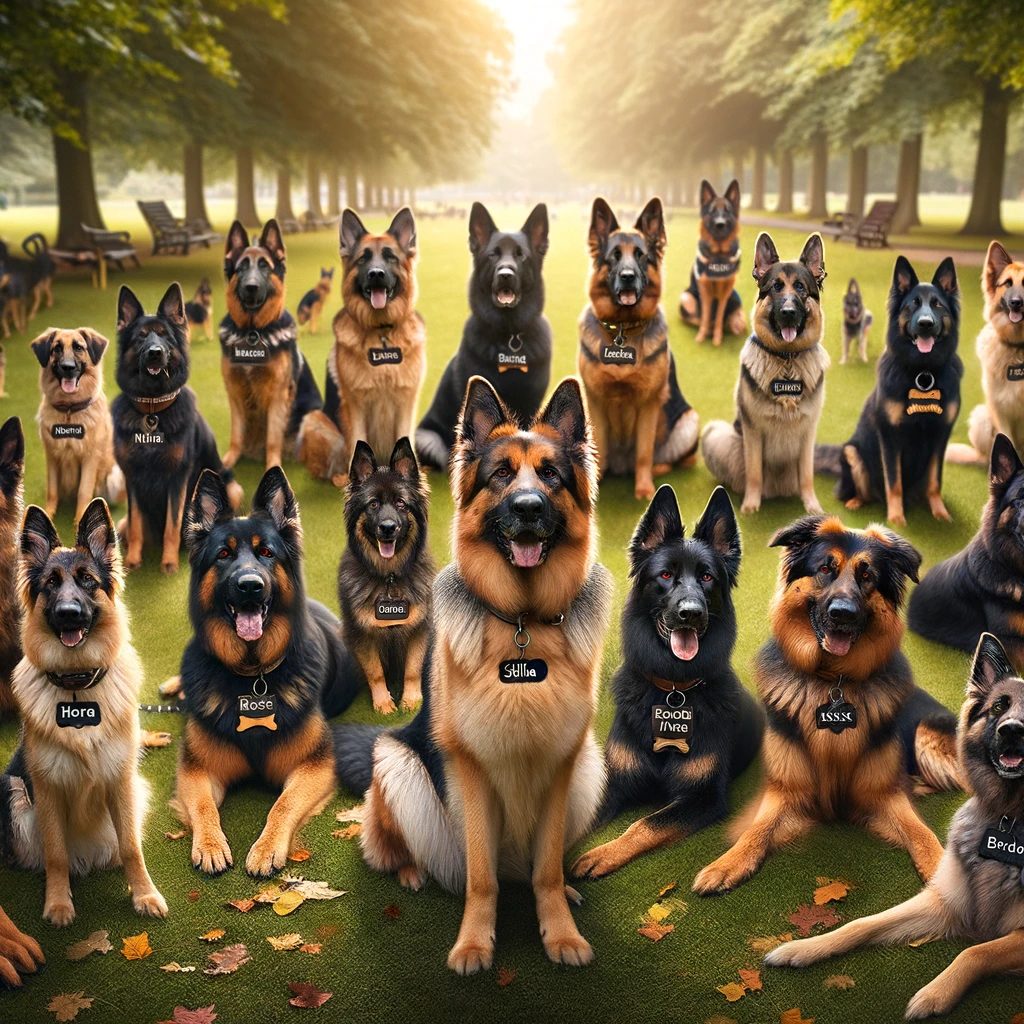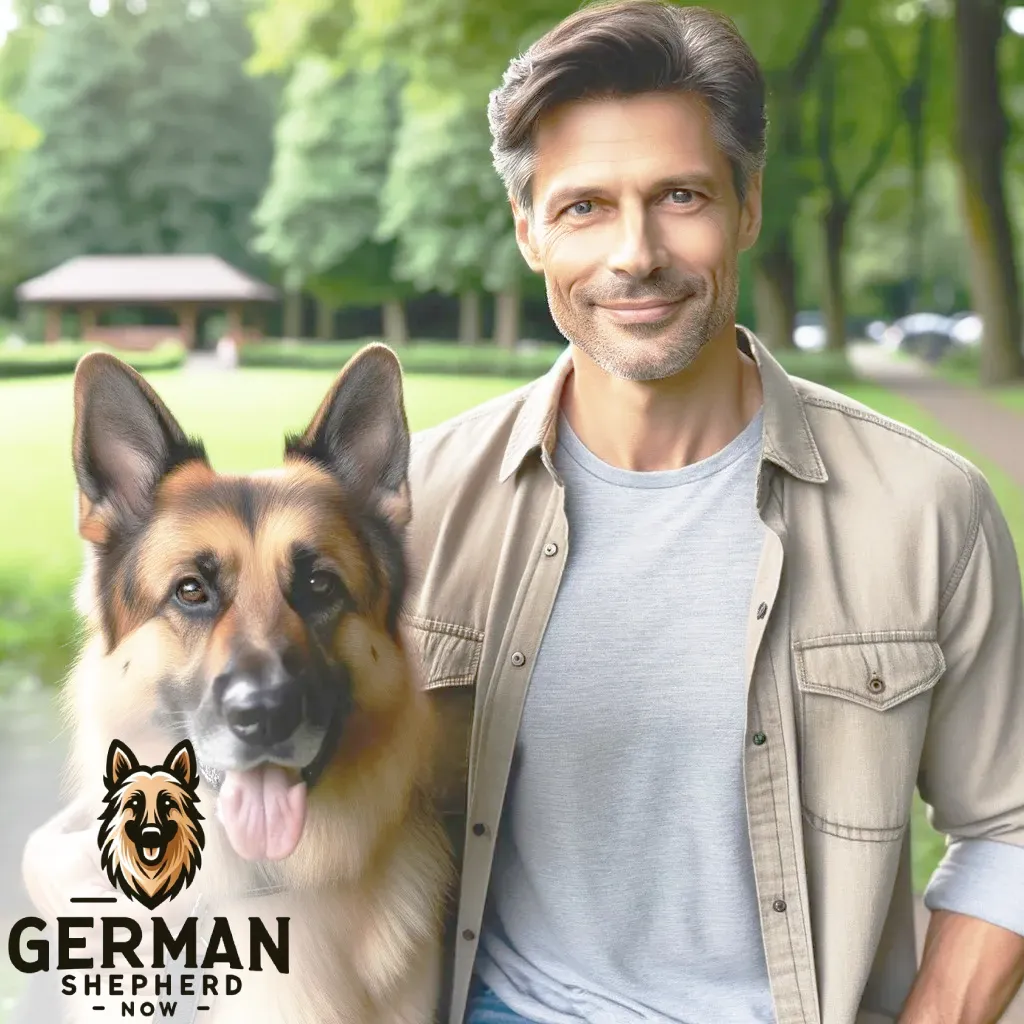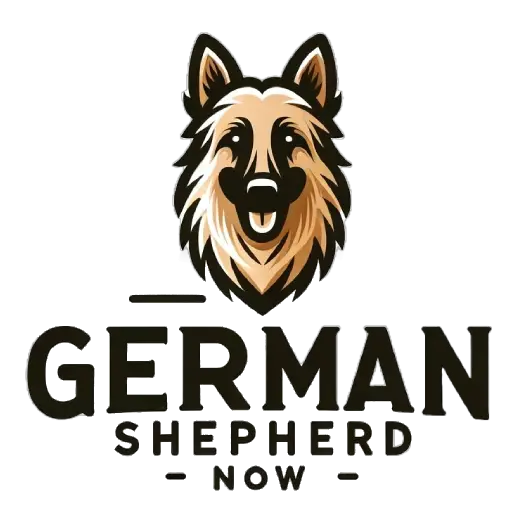Dog Names With Meanings For German Shepherds

Consider strong and classic names like Max, Luna, Rex, and Bella when naming a German Shepherd.
Try names like Klaus, Gretchen, Adler, or Heidi for a name reflecting their German heritage.
Names like Guardian, Shadow, Duke, or Athena are fitting for their protective and loyal nature.
For a unique touch, names like Blitz, Koda, Nova, or Freya can be distinctive and memorable.
The Importance of Naming a German Shepherd
Choosing the right name for a German Shepherd is more than a symbolic gesture; it plays a significant role in their training and development.
A name creates a personal connection between the dog and its owner, establishing a sense of identity and belonging for the animal. It’s crucial for training, as a distinct and recognizable name helps get the dog’s attention and reinforce commands.
A well-thought-out name can reflect the dog’s personality, traits, or heritage, enhancing the bond between the pet and the owner.
A name for German Shepherds, known for their intelligence and loyalty, can also encapsulate their strong character and capabilities.
In multi-pet households, a unique name helps differentiate between pets, ensuring that each receives specific attention and training.
Naming is the first step in a lifelong journey of companionship and mutual understanding between the German Shepherd and its human family.
Names for Male and Female German Shepherds: Meaningful
German Shepherds are known for their distinctive traits, and their names can reflect their gender and strong characteristics.
Below, I’ve separated the names into two tables – one for male German Shepherds and another for female German Shepherds, each with popular and meaningful names.
Names for Male German Shepherds
| Name | Meaning |
| Max | “Greatest” |
| Rex | “King” |
| Kaiser | “Emperor” in German |
| Thor | Norse god of thunder, representing strength |
| Zeus | King of the Greek gods, symbolizing power |
| Odin | A chief god in Norse mythology, a symbol of wisdom |
| Leo | “Lion,” symbolizing bravery |
| Apollo | Greek god of the sun, symbolizing light and power |
| Bruno | “Brown,” symbolizing earthiness |
| Storm | Reflecting a strong and dynamic nature |
Names for Female German Shepherds
| Name | Meaning |
| Bella | “Beautiful” |
| Luna | “Moon” |
| Athena | Goddess of wisdom and war in Greek mythology |
| Freya | Norse goddess associated with love, beauty, and war |
| Greta | “Pearl,” denoting preciousness |
| Sasha | “Defender of mankind,” highlighting loyalty |
| Zara | “Princess,” denoting nobility |
| Stella | “Star,” representing brightness and guidance |
| Raven | A bird known for its intelligence |
| Nova | “New” symbolizing a new beginning or change |
Teaching a German Shepherd Their Name: Effective Tips
Training a German Shepherd to recognize and respond to their name is fundamental to establishing a strong bond and effective communication.
Here are some detailed tips to ensure this process is successful and enjoyable for the dog and the owner.
Tip 1: Consistency is Key
Use the dog’s name in various situations, ensuring it’s the same every time. Avoid using nicknames or variations, especially in the early stages of training. Consistency helps the dog associate that specific sound with themselves, and their attention is required. When calling them, use a clear and upbeat tone.
For example, when it’s mealtime, call their name before presenting the food. This repetition in different contexts helps reinforce their name as a positive signal requiring attention.
Tip 2: Positive Reinforcement Works Wonders
Whenever the German Shepherd responds to their name, reward them immediately with treats, praise, or affection. This positive reinforcement makes them associate responding to their name with something enjoyable.
The key is timing – the reward must come immediately after they look at or come towards you so they understand what behavior is being rewarded. Use small, tasty treats and verbal praise like “good boy/girl” to encourage them.
You can reduce the threats and rely more on praise as the response becomes more consistent.
Tip 3: Practice in Different Environments
Start training in a quiet, distraction-free environment to allow your German Shepherd to focus. Once they start responding at home, introduce environments with more distractions, like a park or a different room. This helps them learn to respond to their name regardless of their surroundings.
Practice calling their name when they are distracted and increase the level of distraction. This ensures that your dog learns to respond to their name in various situations, which is essential for their safety and your peace of mind.
Tip 4: Avoid Negative Associations
Never use your German Shepherd’s name in a negative or punitive context. If you need to scold or correct them, do it without using their name. This is crucial because you want your dog to respond positively to their name and not associate it with fear, anger, or punishment.
If they start associating their name with negative experiences, they may become reluctant to respond when called. Always strive to make their name something they want to respond to, not something they fear.
Tip 5: Make It a Fun Game
Turn the training into a fun game to keep your German Shepherd engaged and interested. Play hide and seek, where you hide somewhere in the house and call their name.
Reward them when they find you. Another game is the recall game, where you call their name, and when they come to you, you reward them and then run away so they can chase you. This makes the learning process enjoyable, reinforces your desired behavior, and provides mental and physical stimulation for your dog.
Tip 6: Be Patient and Persistent
Patience and persistence are vital when teaching your German Shepherd their name. Some dogs may pick it up, while others might need more time and repetition. Don’t get frustrated or angry if progress seems slow.
Continue practicing keeping each session short and sweet to avoid overwhelming your dog. Over time, with consistent effort and positive reinforcement, your German Shepherd will respond to their name.
Tip 7: Combine with Other Training
Integrate name recognition with basic training commands like ‘sit,’ ‘stay,’ or ‘come.’ This not only reinforces their name recognition but also helps in obedience training.
For example, call their name and give another command like ‘sit’ when they look at you. Reward them for completing the sequence. This multifaceted approach enhances their understanding and responsiveness, making training more effective and cohesive.
Conclusion: Naming and Training Your German Shepherd
Naming your German Shepherd is a meaningful step in forging a deep connection and effective communication with your pet.
The chosen name becomes an integral part of their identity, whether a classic name like Max or Luna or one reflecting their German heritage like Klaus or Heidi.
Teaching them to recognize and respond to this name is vital, involving consistent use, positive reinforcement, and patience.
This process helps train and strengthen the bond between you and your dog, making the name a symbol of trust and companionship.

I’m Martin, and I grew up in the super cool city of Seattle. You know, the place with all the incredible mountains and forests? Yeah, that’s my playground!
Ever since I was little, I’ve been all about nature. I used to wander around the woods with a notebook, doodling all the cool plants and animals I’d find.
